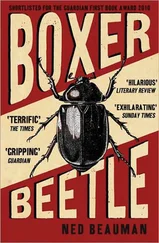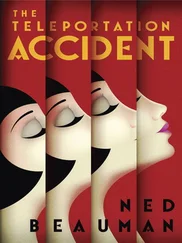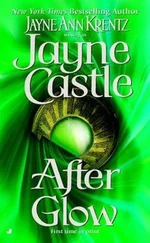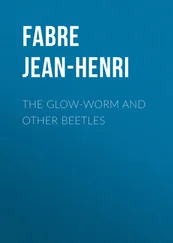He stands in a London street. Above his head, there is a sun, but the sun is both weak and very close, as if the world is ending. On his left there is a post office, followed by a laundrette, a mobile phone shop, a fried chicken shop, a pound shop, a pawnbroker, and a pub, and on his right there is a Chinese takeaway, followed by a greengrocer, a charity shop, a butcher, a hairdresser, a kebab shop, a bookie, and a chemist; and all these are easy to identify even at a distance because their signs just say post office, laundrette, mobile phones, and so on, in an invariant sans-serif typeface. Most of the road has white zigzag lines on either side, but farther on, past a bus stop, a few cars and vans are parked. And about two hundred metres away, blocking the end of the street in a way that you would never see in real life, is an orthogonal pair of two-storey council blocks overlooking a small park with swings and a tree. Everything is a bit too bright and concentrated, sickening, like undiluted orange squash. Raf can hear radios and car horns and the rumble of an overground train, and he can smell chip fat and bus exhaust and fishmonger’s ice melting in the gutter, but there isn’t enough bustle here to generate any of those harmonies, just a few men and women walking up and down the street, nearly all of them Burmese, dressed in cheap sportswear, pretending to have somewhere to go. And there’s no chewing gum on the pavement, no stickers on the lamp-posts, no paint flaking from the windowsills of the flats above the shops — none of the scurf and sebum that distinguishes a body from a mannequin. He’s rendered architectural models on his computer with more texture than this.
Of course, if you put everything together rationally, it becomes apparent that Lacebark have built some sort of film set or theme park here inside the freight depot, but at first sight, before he understood what he was looking at, it seemed more like a dip in the bandwidth of reality itself. When at last the trance breaks, he walks over to the greengrocer and picks up a delicious-looking plastic mango from a cardboard box at the front. Underneath the top layer of mangoes there are chunks of styrofoam to bulk up the pile. If that climbing gym was a mountain, this is the village at the foot of the slopes. Perhaps in some way the tacky fake hologram on his driver’s licence was the visa that got him across the border.
‘Our team can build one of these for you in less than three weeks,’ says Belasco behind him.
Raf turns. ‘My colleague was right. This is. . very impressive.’ He tries to imagine what this place would look like if it were abandoned for a while like that tennis court, and how its progress would compare to a real street that was abandoned at the same time. At first, dilapidation would reveal the differences, but later it would begin to elide them: the two worlds would diverge and then converge, in the same way that two half-siblings might look the same as kids and different as adults and the same again as skeletons. Belasco politely takes the mango from him and puts it back in the box.
‘Maybe I shouldn’t say this, but some of our higher-ups do wonder why we need our own MOUT facility like this. They find it hard to imagine London being exotic to anyone. After all, it’s just London, isn’t it? But if you did your training in Lagos, for instance, terrain like this is going to seem really sparse and exposed. And we also have guys accustomed to desert or mountain operations for whom the opposite is true. They can learn so much in just a few days of exercises here. It justifies the cost even before we start running any of the more specific tactical simulations.’
‘The people who designed all this — were they Londoners themselves?’
‘No,’ says Belasco. ‘We find that natives of the simuland have a tendency to introduce unconscious distortions into their models.’
At this, Raf feels oddly indignant. How can these tourists think they’re qualified to author a précis of a city they can’t possibly understand? Anyway, they can’t really be that concerned with accuracy if they’ve decided to populate their south London microcosm mostly with Burmese extras, one of whom has just strolled into the ‘laundrette’, making Raf wonder how you get recruited for this sort of work, and what the wages are.
‘Let’s take a look at the control room,’ says Belasco.
Behind another steel door up the back stairs of the ‘pub’, two white guys of about Raf’s age sit in voluptuously ergonomic office chairs before a wall of monitors that alternate video feeds with digital control panels. The room is dark except for the shifting diode light that falls across their bodies like crepuscular rays through a stained-glass window. One of them, Raf notices, was just in the middle of eating a supermarket chicken wrap, and there’s a certain stale quality to this control room that reminds him of the fourth hour of an Xbox session at Isaac’s flat. On the floor is a copy of Villepinte’s Lacunosities .
‘From here we can observe and communicate with anyone in the facility,’ says Belasco. ‘And it’s also where we set ambience, climate, time of day. The default is a three-hour day/night cycle with seasonally appropriate weather but of course we can alter that as we like.’
Raf can’t stop himself asking, ‘So instead of three hours you could set it to about twenty-five hours?’
Belasco looks at him quizzically. ‘Sure. Now, Max, give us 4 a.m., heavy rain, please.’
The guy on the left types a few commands on his keyboard, and as darkness falls outside, the screens all switch over to night-vision emerald.
‘It doesn’t look like much from up here,’ says Belasco. ‘You might want to see for yourself.’
Raf wouldn’t have believed he could possibly be enough of a mug to get bewitched twice in a row. But when he goes back downstairs, he can feel grudging tears of wonder in his eyes, like when you’re watching a Hollywood romance that you know is cynical factory product but by the end you just can’t help yourself. Because when he sees the pavement dragging worms of dappled amber out of the reflections of the street lights in its wet rough stone, he could be walking home from a rave in the rain, serotonin still trickling through the gutters of his head. It’s as fake and as real as Cherish’s kiss. The water must be coming from a few hundred sprinklers in the roof, but there’s such a depth to the sound of it, and he wonders if Max upstairs is playing a tape of a real downpour to give the impression of clouds stretching off for miles overhead, the same way a video game will enclose the player in a cuboid called a skybox to suggest a deep horizon when it’s really just a sort of frescoed ceiling. As he looks across at the two council estates lit up like docked spaceships, there is an orange spark in his peripheral vision, and when he turns his head he sees something he can’t possibly have seen — but before he can get a proper look, the ‘sun’ comes back on, and in the time it takes his eyes to adjust, the anomaly has scurried out of view. The rain carries on for a few seconds and then sputters off like a garden hose, leaving the street puddled but bright, and some small stupid part of him wants to search the sky for a rainbow. He realises Belasco has come down the stairs behind him.
‘You know, I wouldn’t like to work in a dark control room all day,’ she confides. ‘But for Max it’s the perfect job. He has a condition called solar urticaria. His skin is very sensitive to sunlight. He gets a rash.’
Raf wonders how the solar urticaria messageboards compare to the non-24-hour sleep/wake syndrome messageboards. Someone should organise a football league for all these different disorders. ‘Denise, is it possible that I saw. .’
Читать дальше












